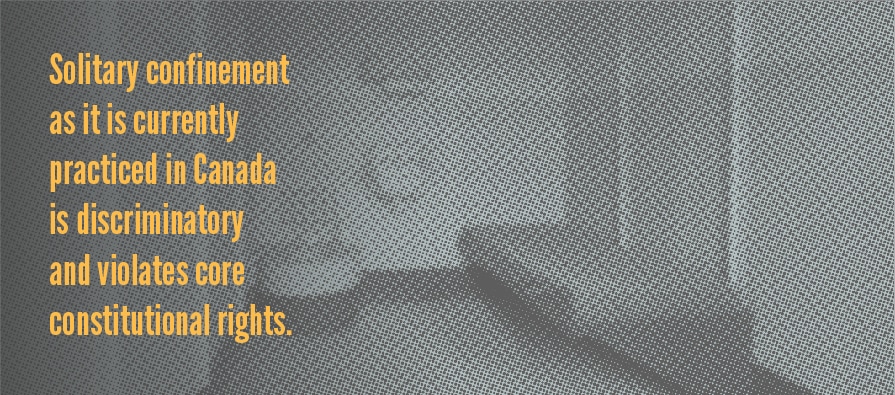On January 17, 2018, the BC Civil Liberties Association and John Howard Society of Canada won a court case challenging the use of solitary confinement in Canada’s federal prisons.
On February 18, 2018, the Federal government appealed this historic judgement, effectively prolonging the use of indefinite solitary confinement in federal prisons.
Now, we’re headed back to court to vigorously defend against the government’s efforts to overturn this historic victory for prisoner’s rights.
The lawsuit that led to the January 2018 decision was filed in 2015 by BCCLA and JHSC. The case alleged that solitary confinement amounts to cruel and unusual punishment that leads to suffering and deaths, deprives people of fundamental procedural protections, and is especially discriminatory against people who struggle with mental health, people with disabilities, and Indigenous people.
Following a 9 week trial in the summer of 2017, the Court issued a judgement calling for the end of the practice of long-term solitary confinement. The Court held that the laws are unconstitutional in that they permit prolonged, indefinite solitary confinement, fail to provide an independent review of segregation placements, and deprive inmates of the right to counsel at segregation review hearings.
Rather than truly learning from the evidence provided by people with direct experience and expert witnesses, the government is doubling down in court on their system of institutionalized torture.
Indefinite Solitary Confinement is Torture
In Canada, one out of every four prisoners in the federal prison system has spent some time in solitary confinement. At any given time, there are as many as 1800 people in solitary confinement in federal or provincial prisons.
International bodies and experts, including the UN Special Rapporteur on Torture and the UN Committee Against Torture have concluded that prolonged or indefinite solitary confinement amounts to torture.
The negative effects of long-term solitary confinement are well-documented. These effects include psychosis, hallucinations, insomnia and confusion. Solitary confinement can create mental illness where none previously existed, or exacerbate pre-existing illness. It is a risk factor for prison suicide. The suicide rate for incarcerated individuals is seven times the rate of Canadians outside the prison system, with nearly half of those suicides occurring in solitary confinement.
It’s time to end the abuse of solitary confinement
The BC Supreme Court’s decision on solitary confinement was damningly clear – prolonged, indefinite solitary confinement is unconstitutional and must end.
Solitary confinement has led to preventable death and suffering. It is discriminatory in its use – Indigenous people and people with mental health issues are placed in solitary confinement at a rate higher than other populations in prison.
Solitary confinement is increasingly being used to warehouse people with mental health issues, despite clear evidence that lengthy isolation can seriously worsen mental illness. Under the “administrative segregation” regime, people are deprived of fundamental procedural protections. People can spend months, and up to years in solitary confinement without a single hearing before an independent body to determine whether their confinement is justified.
BobbyLee’s story: Taking action to end indefinite solitary confinement
In 2011, the BCCLA sued the federal government on behalf of our client, BobbyLee Worm, a young Indigenous woman from Saskatchewan, who was held in solitary confinement for over three and a half years under a program known as the ‘Management Protocol.’
BobbyLee spent 747 consecutive days in solitary confinement. Speaking of her experience, BobbyLee recalls:
Two days after the BCCLA filed its lawsuit, BobbyLee was released from solitary confinement. Today, she is living happily with her partner and children, and working with the BCCLA to end the abuse of long-term solitary confinement for all prisoners.
In this short film by our friend and acclaimed filmmaker Kevin Eastwood of Optic Nerve Films, BobbyLee tells a small piece of her story.
The fight continues.
The Canadian federal government has ignored repeated calls to reform its use of solitary confinement for decades. Instead of meaningfully acting on our BC Supreme Court decision, which ruled that indefinite solitary confinement violate the Charter rights of prisoners, the government has filed an appeal in attempt to overturn this decision.
The current federal government came into office on a promise to end indefinite solitary confinement. Yet, they have disregarded the countless recommendations that have called for an end to this unjust regime. They failed to act on the 1996 recommendations of former Supreme Court justice Louise Arbour to place strict time limits on how long a person in prison can be isolated, and calls from the Correctional Investigator – Canada’s federal prison watchdog – to prohibit solitary confinement for the seriously mentally ill. In December 2014, it dismissed similar recommendations from the high-profile inquest into the death of Ashley Smith in solitary confinement.
Our lawsuit at the BC Supreme Court claimed that the provisions of the Corrections and Conditional Release Act (“CCRA”) setting out the “administrative segregation” regime violates s. 7 (protection of life, liberty and security of the person), ss. 9 and 10 (protections against arbitrary detention), s. 12 (prohibition against cruel and unusual treatment) and s. 15 (protection of equality) of the Charter of Rights and Freedoms.
Stand against torture
At a time when the rest of the world is scaling back the use of solitary confinement, Canada remains steadfast in its reliance on a broken and dangerous system. From the Correctional Investigator of Canada to the United Nations, the message to our government has been the same: indefinite solitary confinement must end.
Photo Credit: ewar woowar via Compfight cc
Photo Credit: M_at via Compfight cc



